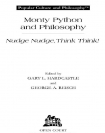Monty Python and Philosophy, Gary Hardcastle [portable ebook reader TXT] 📗

- Author: Gary Hardcastle
Book online «Monty Python and Philosophy, Gary Hardcastle [portable ebook reader TXT] 📗». Author Gary Hardcastle
Hell (Capitalized because Heaven Was Capitalized)
In Monty Python’s The Meaning of Life, after dutifully praising God, the chaplain (Michael Palin) leads the congregation in the following song.
O Lord, please don’t burn us,
Don’t grill or toast your flock.
Don’t put us on the barbecue,
Or simmer us in stock.
Don’t braise of bake or boil us,
Or stir-fry us in a wok.
Apparently there is reason for even the faithful to live in a state of fear and trembling. Since all human beings are born into filthy sin and cannot cleanse themselves, their fate is determined by God. He is the final authority on sin and is accountable to no one. We cannot know how He will decide, and it would be imprudent to wait until Judgment Day to persuade the court. Therefore, the best approach for believers is to beg their loving God in advance for mercy. By having the song follow the prayer, the scene illustrates how ridiculous it is for Christians to worship a God they believe may at any moment capriciously chuck them all into Hell. In the Christian tradition Hell is presented as the final destination for sinners who fail to repent. Nevertheless, as the scene demonstrates, the faithful live in terror that despite their righteousness, they too may be judged unworthy and sentenced to burn forever in the eternal flame.
Socrates would reject that God behaves this way, and in the Apology he explains why the virtuous need not fear death or the afterlife. According to Socrates, death is either a state in which the dead are nothing, with no perception of anything, or death is simply the relocation of the soul from one realm to another. If death is the former, then it is like a dreamless sleep. If death is the latter, souls of the virtuous join those of great men and women already deceased. Imagine abiding with the Queen of Soul, Aretha Franklin, and the Godfather of Soul, James Brown.60
A Short but Grave Reflection about God and Hell (You Can Use This at Your Judgment-Day Trial to Defend Your Wickedness and Disbelief)
The Pythons’ “Please don’t burn us” song asks us to consider the following. The righteous should have no fear of Hell. If God is good and just, as believers claim, why would He condemn the righteous to Hell? The concern that He could do exactly that stems from the Christian portrayal of God as unpredictable and wrathful. After all, God condemned the descendents of Adam and Eve (us) before they were born. According to the Christian tradition, Heaven is not a reward for faithful service, but a gift from God which He may award or withhold. But if God condemns the righteous to Hell as well as the wicked, there is little incentive to be righteous for Heaven’s sake. The Pythons are able to draw humor from these scenes because of the unspoken belief of righteous yet “God-fearing” Christians. If the faithful and righteous must live in fear, God must be one bad-mutha-shut-yomouth.
Justice (A Philosopher Is Observed)
In an early scene from Monty Python and The Holy Grail, a mob intends to burn a woman whom they claim is a witch. How do they know she is a witch? She looks like one. The mob’s chief representative, Eric Idle, confesses that they dressed the woman to look like a witch, but nevertheless insists she is a witch. Apparently clothes make the woman. A philosophical cleric, played by Terry Jones, announces that there is a logical way to determine whether the woman in question is actually a witch. He leads them through the following (slightly abridged) line of reasoning:
JONES: What do you do with witches?
IDLE/MOB: Burn them!
JONES: What do you burn apart from witches?
IDLE/MOB: Wood.
JONES: So, why do witches burn?
IDLE/MOB: ’Cause they’re made of wood?
JONES: Good! How do we tell if she is made of wood? Does wood sink in water?
IDLE/MOB: No, it floats.
JONES: What else floats in water?
IDLE/MOB: A duck.
JONES: So, logically, if she weighs the same as a duck . . .
IDLE/MOB: She’s made of wood!
JONES: And therefore?
IDLE/MOB: A witch!
This scene presents how believers are willing





Comments (0)